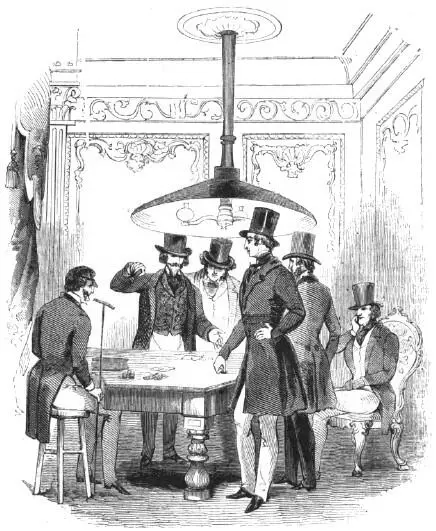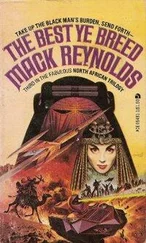Thus is it that in the evening the Quadrant has a characteristic set of loungers of its own:—or, at least, it is frequented after dusk by a population whose characters are easily to be defined.
A bright lamp burnt in the fan-light over the door of No. ——. Mr. Chichester gave a loud and commanding knock; and a policeman standing by, who doubtless had several golden reasons for not noticing anything connected with that establishment, instantly ran across the road after a small boy whom he suspected to be a thief, because the poor wretch wore an uncommonly shabby hat. The summons given by Mr. Chichester was not immediately answered. Five minutes elapsed ere any attention was paid to it; and then the door was only opened to the small extent allowed by a chain inside. A somewhat repulsive looking countenance was at the same time protruded from behind the door.
"Well?" said the man to whom the countenance belonged.
"All right," returned Chichester.
The chain was withdrawn, and the door was opened to its full extent. The party was thereupon admitted, with some manifestations of impatience on the part of the porter, who no doubt thought that the door was kept open too long, into a passage at the end of which was a staircase covered with a handsome carpet.
Chichester led the way, and his companions followed, up to a suite of rooms on the first floor. These were well furnished, and brilliantly lighted; and red moreen curtains, with heavy and rich fringes, were carefully drawn over the windows. Splendid mirrors stood above the mantels, which were also adorned with French timepieces in or molu , and candelabra of the same material. On one side of the front room stood a bouffet covered with wines and liquors of various descriptions.
In the middle of that same front apartment was the rouge et noir table. On each side sate a Croupier , with a long rake in his hand, and a green shade over his eyes. Before one of them was placed a tin case: this was the Bank ;—and on each side of that cynosure of all attention, stood little piles of markers, or counters.
Two or three men—well but flashily dressed, and exhibiting a monstrous profusion of Birmingham jewellery about their persons—sate at the table. These were the Bonnets —individuals in reality in the pay of the proprietor of the establishment, and whose duties consist in enticing strangers and visitors to play, or in maintaining an appearance of playing deeply when such strangers and visitors first enter the room.
The countenances of the croupiers were cold, passionless, and totally devoid of any animation. They called the game, raked up the winnings, or paid the losings, without changing a muscle of their features. For all that regarded animation or excitement, they might have been easily passed off as automatons.

Not so was it with the Bonnets. These gentlemen were compelled to affect exuberant joy when they won, and profound grief or rage when they lost. From time to time they paid a visit to the sideboard, and helped themselves to wine or spirits, or regaled themselves with cigars. These refreshments were supplied gratuitously to all comers by the proprietor: this apparent liberality was upon the principle of throwing out a sprat to catch a whale.
When none save the Croupiers and Bonnets are present, they throw aside their assumed characters, and laugh, and joke, and chatter, and smoke, and drink; but the moment steps are heard upon the staircase, they all relapse with mechanical exactitude into their business aspect. The Croupiers put on their imperturbable countenances as easily as if they were masks; and the Bonnets appear to be as intent upon the game, as if its results were to them perspective life or death.
The Croupiers are usually trustworthy persons well known to the proprietor, or else shareholders themselves in the establishment. The Bonnets are young men of education and manners, who have probably lost the ample fortunes wherewith they commenced life, in the very whirlpool to which, for a weekly stipend, they are employed to entice others.
In one of the inner rooms there was a roulette-table; but this was seldom used. A young lad held the almost sinecure office of attending upon it.
The front room was tolerably crowded on the evening when Chichester, Markham, the baronet, and Talbot, honoured the establishment with a visit.
The moment they entered the apartment, Richard instinctively drew back, and, catching hold of Chichester's arm, whispered to him in a hurried and anxious manner, "Tell me, is this a Gambling-House? is it what I have heard called a Hell?"
"It is a Gambling-House, if you will, my dear fellow," was the reply; "but a most respectable one. Besides—you must see life, you know!"
With these words he took Markham's arm, and conducted him up to the rouge et noir table.
A young officer, whose age could not have exceeded twenty, was seated at the further end of the green-baize covered board. A huge pile of notes and gold lay before him; but at rapid intervals one of the Croupiers raked away the stakes which he deposited; and thus his heap of money was gradually growing smaller.
"Well, this is extraordinary!" ejaculated the young officer; "I never saw the luck set so completely in against me. However—I can afford to lose a little; for I broke your bank for you last night, my boys?"
"What does that mean?" demanded Richard in a whisper.
"He won all the money which the proprietor deposited in that tin case, he means," replied Chichester.
"And how much do you suppose that might be?"
"About fifteen hundred to two thousand pounds."
"Here—waiter!" exclaimed the young officer, who had just lost another stake—"a glass of claret."
The waiter handed him a glass of the wine so demanded. The young officer did not notice him for a moment, but waited to see the result of the next chance.
He lost again.
He turned round to seize the glass of wine; but when his eyes caught sight of it, his countenance became almost livid with rage.
"Fool! idiot!" he ejaculated, starting from his seat: "bring me a tumbler—a large tumbler full of claret; my mouth is as parched as h—l, and my stomach is like a lime-kiln."
The waiter hastened to comply with the wishes of the young gambler. The tumbler of claret was supplied; and the game continued.
Still the officer lost.
"A cigar!" he shouted, in a fearful state of excitement—"bring me a cigar!"
The waiter handed him a box of choice Havannahs, that he might make his selection.
"Why the devil don't you bring a light at the same time, you d—d infernal rascal?" cried the gamester; and while the domestic hastened to supply this demand also, he poured a volley of most horrible oaths at the bewildered wretch's head.
Again the play proceeded.
And again the young officer lost.
His pile of gold was gone: the Croupier who kept the bank changed one of his remaining notes.
"That makes three thousand that I have lost already, by G—d!" ejaculated the young officer.
"Including the amount you won last night, I believe," said one of the Bonnets.
"Well, sir, and suppose it is—what the deuce is that to you?" demanded the officer fiercely. "Have I not been here night after night for these six weeks? and have I not lost thousands—thousands? When did I ever get a vein of good luck until last night? But never mind—I'll play on—I'll play till the end: I will either win all back, or lose everything together. And then—in the latter case—"
He stopped: he had just lost again. His countenance grew ghastly pale, and he bit his lips convulsively.
Читать дальше













